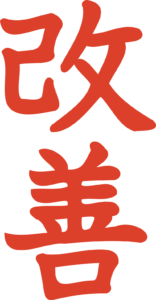What is Kaizen? Continuous Improvement
 So, what is KAIZEN? Kaizen is a Japanese term that translates to “change for the better” or “continuous improvement.” It’s a philosophy and approach widely used in business, manufacturing, and management that focuses on making small, incremental changes consistently over time to improve processes, efficiency, and quality. Key aspects of Kaizen include:
So, what is KAIZEN? Kaizen is a Japanese term that translates to “change for the better” or “continuous improvement.” It’s a philosophy and approach widely used in business, manufacturing, and management that focuses on making small, incremental changes consistently over time to improve processes, efficiency, and quality. Key aspects of Kaizen include:
1. Continuous Improvement:
Rather than seeking large, radical changes, Kaizen encourages small, steady improvements in various processes and workflows.
KAIZEN means 'Change for the better'
2. Employee Involvement:
Kaizen relies heavily on the participation of all employees, from top management to front-line workers. Everyone is encouraged to suggest improvements and contribute to bettering the organization.
3. Elimination of Waste:
One of the core principles of Kaizen is to identify and eliminate waste (known as “muda” in Japanese), whether it’s in time, materials, or resources, to streamline processes.
4. Standardization:
Once improvements are identified and successfully implemented, the new process becomes the standard, which then serves as the baseline for further improvements.
Kaizen is often associated with the Toyota Production System (TPS), where it played a key role in helping the company achieve high levels of efficiency and quality in manufacturing. Today, Kaizen is used in various industries beyond manufacturing, including healthcare, IT, and service sectors.
Thank you from Asheville, North Carolina. The Green Phial.




